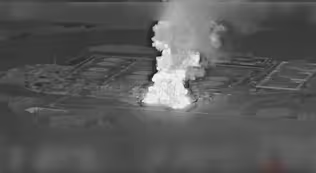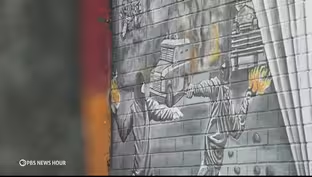
FEMA employees critical of Trump placed on leave
Clip: 8/27/2025 | 6m 37sVideo has Closed Captions
FEMA employees critical of Trump placed on leave amid crackdown on dissent
About two dozen FEMA employees have been placed on leave after they signed an open letter criticizing the Trump administration’s cuts and personnel decisions. The letter warns the cuts undermine the progress FEMA has made after Hurricane Katrina, a storm that slammed the Gulf Coast 20 years ago this week. Amna Nawaz discussed the changes with Craig Fugate, the FEMA administrator from 2009 to 2017.
Problems playing video? | Closed Captioning Feedback
Problems playing video? | Closed Captioning Feedback
Major corporate funding for the PBS News Hour is provided by BDO, BNSF, Consumer Cellular, American Cruise Lines, and Raymond James. Funding for the PBS NewsHour Weekend is provided by...

FEMA employees critical of Trump placed on leave
Clip: 8/27/2025 | 6m 37sVideo has Closed Captions
About two dozen FEMA employees have been placed on leave after they signed an open letter criticizing the Trump administration’s cuts and personnel decisions. The letter warns the cuts undermine the progress FEMA has made after Hurricane Katrina, a storm that slammed the Gulf Coast 20 years ago this week. Amna Nawaz discussed the changes with Craig Fugate, the FEMA administrator from 2009 to 2017.
Problems playing video? | Closed Captioning Feedback
How to Watch PBS News Hour
PBS News Hour is available to stream on pbs.org and the free PBS App, available on iPhone, Apple TV, Android TV, Android smartphones, Amazon Fire TV, Amazon Fire Tablet, Roku, Samsung Smart TV, and Vizio.
Providing Support for PBS.org
Learn Moreabout PBS online sponsorshipAMNA NAWAZ: Approximately 20 employees at the Federal Emergency Management Agency have been placed on leave after they signed an open letter on Monday criticizing the Trump administration's cuts and personnel decisions at the agency.
The letter warns the changes undermine progress FEMA's made in the decades after Hurricane Katrina, a storm that slammed into the Gulf Coast 20 years ago this week, killing more than 1,000 people and displacing hundreds of thousands more.
We're joined now by someone who has nearly a decade of experience at the top of that agency, Craig Fugate, who was nominated by Barack Obama and served as FEMA administrator from 2009 to 2017.
Craig Fugate, welcome back to the "News Hour."
Thanks for joining us.
CRAIG FUGATE, Former Administrator, Federal Emergency Management Agency: Thanks for having me.
AMNA NAWAZ: So this letter was signed by 180 current and former FEMA staffers, many of them doing so anonymously.
In the letter, they said they sent it -- quote -- "to prevent not only another national catastrophe like Hurricane Katrina, but the effective dissolution of FEMA itself and the abandonment of the American people such an event would represent."
Craig, before we get into the details of the letter, what does it say to you that they felt the need to send it at all?
CRAIG FUGATE: You know, every federal employee takes an oath of office.
And that oath of office refers to defending the Constitution against all enemies foreign and domestic, but it goes down further and says, uphold the duties of your office.
And that's an oath you're sworn to.
So for these people to find that they were placed in a situation where, if they followed their oath, they needed to speak up, it would have been a lot easier just to go along, keep their jobs.
Many of these folks will face potential termination.
They knew those risks.
So, to me, knowing the people I worked with at FEMA, it's somewhat extraordinary that they put everything on the line to get the word out to the public.
AMNA NAWAZ: And the fact that many of them were placed on leave as a result of signing on to that letter, what does that say to you?
CRAIG FUGATE: It's interesting, because there are certain whistle-blower protections.
There's also freedom of speech.
As long as they're doing their jobs and not failing to carry out direction, there's not much that I think they can do as far as terminations, although I think they will find a way.
So probably the least egregious thing they could do is to put them on leave with pay and make them check in daily, sort of like a purgatory for a federal employee.
You are not able to do your job, but, at the same time, you're not allowed to go do anything else.
AMNA NAWAZ: So there's two central complaints in the letter I want to get your take on.
One is the staffing cuts.
The other is the leadership at the agency.
On the latter, the concern seems to be that the acting administrator right now, David Richardson, does not have any disaster response experience.
And on the former, it's the fact that a third of the agency's full-time staff have now left the agency this year.
When you look at who's in charge and who is left to do the work, do you think FEMA can see through its mission?
Is it able to do the work it's supposed to do?
CRAIG FUGATE: Well, I'm not there.
And it's hard to say.
Obviously, employees there felt that.
But I will refer everybody back to the post-Katrina Emergency Management Reform Act, of which Senator Collins was the primary author.
A key component of that was establishing the requirements for a FEMA administrator.
And, if you notice, the administration is very careful.
They never say acting administrator.
I think they are aware that they would perhaps invoke the clause of the requirements to serve in that position.
So they seem to be using terminology to avoid the statute, but the statute stands.
It hasn't been repealed.
I have seen no instance where Congress has granted any deferments on that.
There are other provisions in there that says the secretary may not substantially change FEMA's mission, reorganize it.
Again, a lot of this came out of what was going on at FEMA prior to Katrina.
And the findings of Congress should not repeat that going forward.
AMNA NAWAZ: Well, when you look at this administration's plans for this agency, we know both President Trump and Secretary Noem have said at some point they want to eliminate FEMA.
They have both since backed off that language somewhat.
But the president's 2026 budget does call for $646 million in cuts.
What would be the impact of those kinds of cuts?
Who does it affect?
CRAIG FUGATE: Well, it depends on where the money is being cut.
A lot of this is going to be in preparedness activities, training funds, grants that went to state and local governments.
And you need to remember, a lot of these funds were created in the aftermath of the terrorist attacks on 9/11.
And so, as we have built the capabilities to respond to greater events, including terrorist events, we have gone through several phases of reduced funding.
When I was at FEMA, we went through reduced funding during sequestration and reduced funding.
This would continue that trend.
Again, this is policy.
This is something that Congress ultimately has to decide.
And, ultimately, the question will be, if we reduce the funding for preparedness activities, what does that mean to be able to respond and recover from disasters, especially since there's a lot of discussion about moving more of the reoccurring routine disasters back to the state and local governments to manage, with FEMA being primarily for the larger catastrophic disaster responses?
AMNA NAWAZ: So we're marking 20 years since Hurricane Katrina this week.
People largely look back on it now and think the storm was the first disaster.
The federal response in many ways was the second disaster.
Do you worry now that you could see the same kind of disaster when it comes to a federal response, given the pace and intensity of natural disasters we're seeing?
CRAIG FUGATE: I'm very concerned.
I think, when you look at what we learned from Katrina, the -- probably the biggest one is leadership.
Second one is speed.
Congress directed that FEMA going forward from Katrina would not have to wait for formal requests from a governor.
That was one of the things that came up over and over again, is that FEMA really came act until a governor asked.
And, again, as everybody talks about reforming FEMA, Congress has in the House Transportation Infrastructure proposed major reform, many of which would address issues the president has brought up.
But just merely by taking FEMA apart or abolishing FEMA, I don't think is the answer.
AMNA NAWAZ: Former FEMA Administrator Craig Fugate joining us tonight.
Craig, thank you so much for your time.
CRAIG FUGATE: Thanks for having me.
Cracker Barrel backlash reveals the power of branding
Video has Closed Captions
Clip: 8/27/2025 | 5m 44s | What the Cracker Barrel backlash reveals about the power of branding (5m 44s)
Minneapolis mayor calls for action after school attack
Video has Closed Captions
Clip: 8/27/2025 | 11m 16s | 'We owe this to our children': Minneapolis mayor calls for action after school attack (11m 16s)
News Wrap: Feds taking control of D.C.'s Union Station
Video has Closed Captions
Clip: 8/27/2025 | 7m 14s | News Wrap: Trump administration taking over management of D.C.'s Union Station (7m 14s)
Russia, Ukraine target energy infrastructure as war persists
Video has Closed Captions
Clip: 8/27/2025 | 4m 7s | Russia and Ukraine target each other's energy infrastructure as war persists (4m 7s)
'Wake up,' Miles Taylor warns as Trump punishes opponents
Video has Closed Captions
Clip: 8/27/2025 | 6m 16s | Miles Taylor warns: 'We need America to wake up' as Trump punishes opponents (6m 16s)
What Americans can learn from Northern Ireland's history
Video has Closed Captions
Clip: 8/27/2025 | 11m 31s | What Americans can learn from Northern Ireland's history of political violence (11m 31s)
Providing Support for PBS.org
Learn Moreabout PBS online sponsorshipSupport for PBS provided by:
Major corporate funding for the PBS News Hour is provided by BDO, BNSF, Consumer Cellular, American Cruise Lines, and Raymond James. Funding for the PBS NewsHour Weekend is provided by...

















